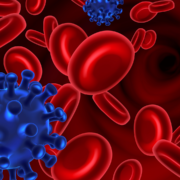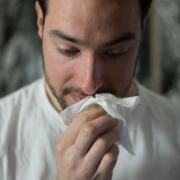Are You Reaching for Tissues?
Spring is a beautiful time of year with trees bursting forth in fresh, green growth and flowers blooming in a rainbow of colors. For many of us, though, spring means excess mucus, itchy eyes and skin, and frustrating symptoms related to allergies. Are you reaching for tissues regularly?
As a child, I had plenty of challenges with allergies, including frequent breakouts in hives, swollen lips, and the more common runny nose and itchy eyes. No fun!
The modern habit of using antibacterial products reduces our exposure to environmental microbes. This seems like a good thing, but it actually disrupts our normal immune development and increases the risk for allergic reaction and disease.
Educating the Immune System
I’m sure you’ve heard of the microbiome comprised of bacteria in your gut. It is much more widespread than many realize, including on your skin, in your mouth, and nose. Mucosal surfaces on your body, including your lungs and nasal passages, are colonized by a distinct group of microbes.
Far from causing harm, these microbes “teach” your immune system to tolerate dietary proteins and other harmless things encountered in the environment.
Studies suggest that exposure to a diverse array of microbes early in life effectively “trains” our immune system. Just as infants need to learn as they grow, their immune system needs to know what is harmless – friendly microbes or dietary proteins – and what pathogenic microbes are harmful.
Alternative Allergy Support
We weren’t aware of these microbes during my childhood, and I endured 5 years of allergy shots to help calm my immune system. Nowadays we know of other effective approaches, such as:
- Take probiotics and eat fermented foods – think sauerkraut and kefir – to help bring the microbiome and your immune system back into balance.
- Eat foods such as plantains, cassava, or sweet potatoes which provide fiber that is fermented by gut bacteria. This process results in the formation of short-chain fatty acids (SCFAs) that regulate the immune system.
- Get tested for food sensitivities which cause a delayed immune response and cause low-grade inflammation. I offer a simple blood spot test that can get you started.
- Try a low-histamine diet which can often reduce the severity of allergy symptoms. Foods high in histamine include aged cheese, citrus fruits, fish, shellfish, avocados, spinach, and chocolate. Also, avoid eating leftover foods as these also promote histamine.
- Consider taking Quercetin (a natural antihistamine) or DiAmine Oxidase (the enzyme responsible for breaking down histamine) for particularly rough days. Using antihistamine herbs like thyme in your cooking and drinking holy basil (Tulsi) tea can help, too.
- Try local raw honey for your seasonal allergies. Raw honey contains both beneficial bacteria and trace amounts of pollen picked up by the bees from local plants. Consuming raw honey produced in your area can help to “educate” your immune system to tolerate the local outdoor allergens.
You don’t have to rely on prescription or over-the-counter meds when the symptoms of allergies keep you from functioning at your best. Natural supplements and foods can support your physiology and help to retrain your immune system so that it is more tolerant.
Other Great Reads About Fighting Allergies
Could Your Liver Influence Your Allergies?
Natural Tips to Handle Troublesome Allergy Symptoms
Natural Remedies for Allergy Relief
Ready For Some Help?
Whether your symptoms are allergy related or not, are you tired of trying to navigate them? Perhaps it’s time to talk with me to see whether a Functional Consultation would be beneficial. Schedule a short call with me and we can explore how I can help you pursue wellness!









